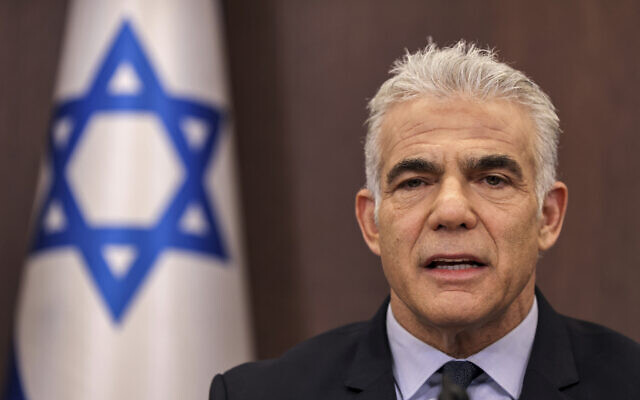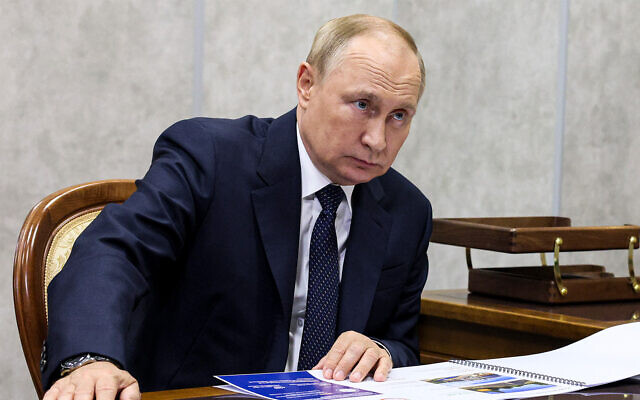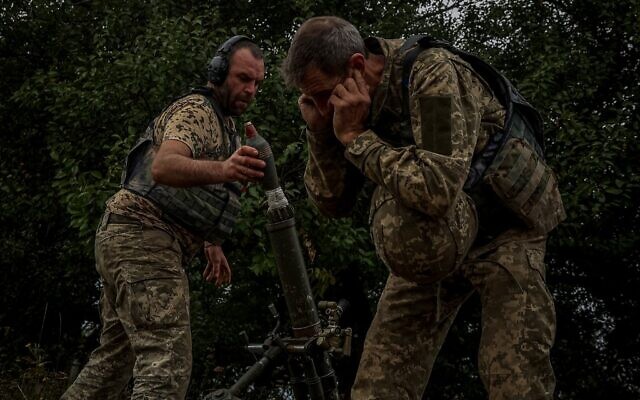Kremlin-installed authorities were already claiming victory Tuesday in annexation votes in Ukrainian regions under Russian control, as Moscow warned it could use nuclear weapons to defend the territories.
Ukraine and its allies have denounced the so-called referendums as a sham and said the West would never recognize the results of the ballots that have dramatically ratcheted up the stakes of Russia’s seven-month invasion.
Israel on Saturday joined their ranks, with the Foreign Ministry saying in a statement that Jerusalem “recognizes the territorial integrity and sovereignty of Ukraine, and will not recognize the results of the referendums in its eastern districts.”
Israel’s clear rejection of the votes could further raise tensions with Moscow. Jerusalem has sought to maintain cordial relations with Russia despite criticizing the invasion of Ukraine, both due to Russia’s control of Syrian airspace and its large Jewish community.
Meanwhile, Vladimir Saldo, the Moscow-appointed head of the Russian-held Kherson region, said on social media: “It’s already clear that the vast majority of people supported the issue of secession from Ukraine and joining Russia.”
Get The Times of Israel's Daily Edition by email and never miss our top stories
Election officials in Moscow said voters casting their ballots in Russia had overwhelmingly backed annexation, while authorities in Kherson and another Russian-occupied region, Zaporizhzhia, showed an initial 87 and 92 percent backing for the move.
“Saving people in the territories where this referendum is taking place… is the focus of the attention of our entire society and of the entire country,” Russian President Vladimir Putin said earlier during a televised meeting with officials.

Prime Minister Yair Lapid attends the weekly cabinet meeting in Jerusalem, on September 18, 2022. (Ronaldo Schemidt/Pool Photo via AP)
His spokesman Dmitry Peskov said the votes would have “radical” legal implications and that the so-called referendums “will also have consequences for security,” referring to Moscow’s threats to use nuclear weapons to defend its territory.
But Ukrainian Foreign Minister Dmytro Kuleba doubled down on Kyiv’s promise to push out Russian forces from its country, saying the votes “would not have any influence” on the battlefield.
Russian forces in Ukraine this month have suffered serious setbacks, both in the east and south of the country, which observers say pushed Putin to rush ahead with the vote to cement Moscow’s authority there.
Putin said Russia would use any and all available means to defend its territory, implying that after the four regions were annexed Moscow could deploy strategic nuclear weapons to repulse Ukrainian attempts to take back the territory.
“I want to remind you — the deaf who hear only themselves: Russia has the right to use nuclear weapons if necessary,” former leader Dmitry Medvedev warned Tuesday on social media.

Russian President Vladimir Putin during a meeting in Veliky Novgorod, Russia, September 21, 2022. (Gavriil Grigorov, Sputnik, Kremlin Pool Photo via AP)
The four Russian-occupied regions of Ukraine — Donetsk and Lugansk in the east and Kherson and Zaporizhzhia in the south — announced that they would hold the elections just days before voting began last Friday.
Together, they form a crucial land connection for the Kremlin between Russia and the Crimean peninsula, which Moscow annexed in 2014 and is otherwise only connected to the mainland by a bridge.
The EU spokesman Peter Stano announced the bloc would slap sanctions on organizers of the “illegal” vote, following a similar move by Britain earlier in the week.
“The sham referenda held by Russia have no legitimacy and are a blatant violation of international law. These lands are Ukraine,” NATO chief Jens Stoltenberg said on Twitter.
French Foreign Minister Catherine Colonna meanwhile was in Kyiv for a surprise visit to meet with President Volodymyr Zelensky and underscore her country’s support for Ukraine’s “sovereignty and territorial integrity.”

Ukrainian soldiers fire a mortar launcher at a position along the front line in the Donetsk region on September 26, 2022, amid Russia’s invasion of Ukraine. (ANATOLII STEPANOV / AFP)
Even Moscow’s closest ally since the start of the invasion, Beijing, said after the votes were announced last week that Russia should respect territorial integrity in the war.
The so-called referendums follow a pattern that Moscow utilized in Crimea after nationwide street demonstrations saw Ukraine’s Kremlin-friendly president ousted.
Like then, the outcome of the ballot is being viewed by observers as a foregone conclusion. Election officials brought ballot boxes door-to-door in many cases accompanied by armed Russian forces.
Lawmakers are expected to vote hastily to annex the territories after the results are announced and Russian news agencies have said Putin could sign legislation formalizing the land grab this week.
Ukrainian forces meanwhile have pursued their counter-offensive in the east.
The governor of the eastern Kharkiv region announced Tuesday its forces had recaptured Kupiansk-Vuzlovyi, “one of the largest logistical and railway junctions” in the region and not privy to this week’s vote.
Polling stations were open in Crimea for people who fled fighting after the Russian invasion in February.
“With my voice I want to try to make a small contribution to stopping the war,” 63-year-old Galina Korsakova from Donetsk told AFP. “I really want to go home.”
Along with threats to use nuclear weapons, Putin announced a mobilization of hundreds of thousands of Russian men to bolster Moscow’s army in Ukraine, sparking demonstrations and an exodus of men abroad.
The United Nations voiced alarm on Tuesday at credible reports of nearly 2,400 arrests in less than a week during nationwide protests in dozens of cities against the draft order.
Ex-Soviet Georgia, which was invaded by Russia in 2008, said the numbers of Russians crossing its borders had increased to around 10,000 people daily since Putin’s announcement.
Kazakhstan, the Central Asian country on Russia’s southern border, meanwhile said nearly 100,000 people had entered the country since September 21 and its leader Kassym-Jomart Tokayev said authorities would “ensure their safety”.
The Russian defense ministry said it would not seek the extradition of those who fled to Georgia and Kazakhstan to evade the draft.


